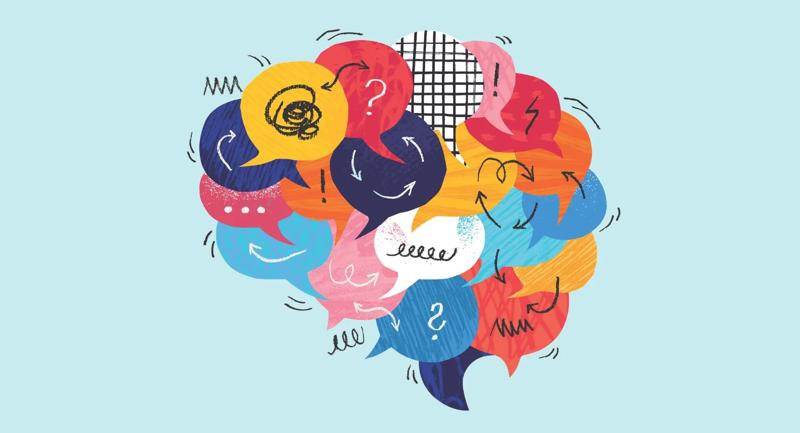I don't mean to alarm you, but—with the exception of the article you've just started reading—nearly everything you will read in this magazine about personalized learning is probably wrong.
Did I just make a radical overstatement in hopes of luring you into reading on? Well, yes. But when the editors of Educational Leadership asked whether I would be interested in contributing to this issue's theme of "Getting Personalization Right," I agreed to do so only under the condition that I be allowed to argue we shouldn't be trying to personalize learning at all. Surprisingly, they agreed.
I'll make the case against personalized learning here primarily by citing evidence from cognitive science, the body of knowledge that directly relates to how people learn. And I'll offer an alternative vision for our education system that emphasizes giving educators latitude to experiment with innovations in education. But first, let's set some ground rules for what we're talking about when we talk about personalized learning.
What Is "Personalized Learning"?
Before I explain why I'm against personalized learning, it's important to have a rough common understanding of what we mean by the term. This, as it turns out, is more difficult than you might imagine. Does personalized learning mean a "student receives a customized daily schedule based on his or her current learning strengths and needs," as New Classrooms (formerly School of One) promotes? Or does it mean "students work at their own pace informed by daily assessments based on their individualized learning plan," as they do in Carpe Diem charter schools? Does it mean redesigning classrooms to have rotating stations, or "flipping" them entirely? What about using adaptive software? The interpretations are endless.
The lack of a common definition of personalized learning has led some astute commentators to suggest we should just stop trying to develop one (Hernandez, 2016). The problem, at least from my perspective, is that the unthinking enthusiasm for personalizing learning will continue to grow unchecked unless we identify at least a few basic principles common to most personalized-learning efforts—and then decide whether those principles should be fostered throughout the education system. So here are three principles that I believe to be common to many definitions of personalized learning:
Personalized learning involves students having greater control over the content they learn.
Personalized learning involves students having greater control over the pace at which they learn.
Personalized learning involves some use of technology to customize learning. Indeed, most of the articles in this issue of EL make reference to some version of these principles.
What's the Evidence?
Before going on, it seems wise to ask what evidence we presently have that personalized learning works.
Answer: Virtually none. One remarkable aspect of the personalized-learning craze is how quickly the concept has spread despite the almost total absence of rigorous research in support of it, at least thus far.
For example, the U.S. Department of Education invested more than $500 million in 21 school districts to support new personalized learning models, yet to date there's no rigorous research evaluating whether this investment improved student outcomes (Herold, 2016). Rigorous here means comparing the results of adopting a personalized-learning model with the results of maintaining the existing approach, ideally through a random-control trial. One research study used this approach to evaluate the School of One personalized-learning effort in New York City and found that the effort "had neither very large positive nor large negative effects relative to the math instruction that students would have otherwise received in the program's first two years … We do not see significant or consistent shifts in student or teacher attitudes and self-reported behaviors" (Rockoff, 2015).
The research cited most often in support of personalized learning is the RAND Corporation study of 62 public schools (90 percent of them charters) that implemented models funded by the Gates Foundation (Pane, Steiner, Baird, & Hamilton, 2015). But that study should be interpreted with a great deal of caution. RAND found positive effects on student achievement in the elementary grades (though not the secondary grades), but it's unclear whether this result was driven by personalized learning itself or other existing features of the participating schools, which had largely been selected through a competitive process. Perhaps this is why John F. Pane, the lead author of the study, later stated:
People who are thinking [about personalized learning] from a programmatic and implementation point of view should not necessarily buy into the advocacy around how great this is. (Herold, 2016)
I submit that this cautionary note should carry weight with educators eager to personalize learning for their students.
Of course, innovations in education will always race ahead of empirical research validating or invalidating the new techniques. And I do not reject personalized learning solely because the evidence base for it is thin. Rather, I reject personalized learning as a desirable pedagogy in part because I believe it contradicts another well-established evidence base related to education: the science of learning.
Why Not Let Students "Have It Their Way"?
I've defined personalized learning as methods that use some form of technology to give students greater control over the content and pace of what they learn. We'll come back to the technology question. For the moment, I want to focus on the personalized-learning principles related to student choice and ask this question: Are the principles underlying personalized learning in harmony with our best scientific understanding of how people learn?
Answer again: No.
If this news comes as a shock to you, don't feel bad—it did for me as well. Indeed, I spent years of my professional career in education vigorously promoting personalized learning as a desirable education policy. Of course we want students to feel more empowered in their learning, right? Of course we want students to learn at their own pace—who could possibly argue against that?
Well, me. Because although the ideas underlying personalized learning are alluring, when it comes to scientific understanding, as physicist Richard Feynman once said, "the first principle is, do not fool yourself—and you are the easiest person to fool" (Feynman, 1974). I submit that we are collectively fooling ourselves on the idea of personalized learning.
Let's explore how one important principle from cognitive science bears directly upon whether students should "have it their way." This isn't the only scientific principle relevant to this discussion, but my space here is limited, and I believe this finding reflects a salient reason why the first two principles of personalized learning are in conflict with learning science.
What's Long-term Memory Got to Do with It?
Here's the rub: Each subject area has some set of facts that, if committed to long-term memory, aid problem solving by freeing working-memory resources and illuminating contexts in which existing knowledge and skills can be applied. The size and content of this set of facts varies by subject matter (Deans for Impact, 2015).
Most personalized-learning efforts I've observed are in conflict with this simple scientific principle. To understand why requires unpacking some terms.
As used here, and simplifying for brevity, working memory involves actively thinking about something. Our working memories are limited: if you make a mental grocery list, you'll likely struggle to remember more than six or eight items. In contrast, long-term memory refers to facts that you have memorized, and no longer need to consciously think about to access. For example, you can read this article because you have committed the English language to your long-term memory.
The relationship between working memory and long-term memory is important in understanding why students may struggle with particular problems. Take math. Students who have memorized the multiplication tables have committed a set of facts to their long-term memory. Because these facts can easily be recalled from long-term memory, students who know them will have more space in their working memory to use when tackling a related math problem. The expansion of long-term memory gives students more space for active thinking.
Let's return to the first principle of personalized learning, that students should have greater control over the content they learn. The relationship between working memory and long-term memory should make us deeply skeptical of this claim. Students who pull content from the Internet as a central part of their learning may be able to make short-term use of the facts they encounter, but unless they've somehow stored these facts in long-term memory—a process unlikely to happen by chance—they won't have really learned them.
Defenders of personalized learning might counter by arguing that if students are allowed to explore what fascinates them through good resources on the Internet, they might be more motivated to commit facts about that subject to long-term memory. There are at least three problems with this notion. First, it's often difficult to discern what makes something a "good" Internet resource versus an untrustworthy source. Second, the process of searching for information is not, in and of itself, an effective strategy for committing that information to long-term memory. Think back to the term papers you wrote in college—how many facts from these exercises can you recall now? Finally, I believe every practicing educator can affirm that what students find fascinating on the Internet tends toward social media and messaging with friends rather than the subject matter of lessons.
The second principle of personalized learning, that students should control the pace of their learning, also runs afoul of cognitive science. That's because effortful thinking—making use of short-term memory—is mentally fatiguing. The brain is similar to other muscles; it takes much energy and effort to exercise conscious, effortful thought. To be sure, there are some students who, for whatever reason, are able to self-direct and accelerate the pace of their own learning. But the majority of students need the equivalent of the trainer in the gym to help them keep on pace to learn. We call these trainers teachers. It's their job to make sure students are getting their mental exercise at the appropriate pace.
Tellingly, schools that implement personalized learning often find they need to create "guardrails" or frameworks around the content students are supposed to learn and the pace at which they learn in it. In other words, schools start to converge on a model not all that different from longstanding education models with a scope and sequence.
What Should We Do Instead?
Notwithstanding my reservations about personalization, I don't believe using technology inherently conflicts with the findings of cognitive science. In fact, I'm bullish on the potential for technology to empower educators in ways that will enhance student learning and usher in innovative practices—provided we disentangle technology from personalized learning.
Instead of focusing on personalizing learning, we should improve the ways in which we prepare and professionally develop school leaders, teachers, and other educators so they can make scientifically informed decisions about instruction—including whether to use any particular technology in the classroom. Put simply, I want educators to be empowered as scientific professionals.
Scientific professionals share three traits: They are interested in learning and applying relevant scientific knowledge to their craft, they have the autonomy to make important decisions about practice, and they're eager to gather evidence that helps them evaluate—and improve—the effectiveness of their practice. For educators to become scientific professionals, they need to understand the science related to teaching and learning. Cognitive science should be part of the knowledge base that teachers receive in their professional training, as should high-quality research in areas like how students learn to read.
In addition to empowering educators with scientific insights, we need to commit to preserving teachers' professional autonomy to make instructional decisions. Too often, leaders decide to implement a new personalized-learning model from the top down. Unsurprisingly, many teachers resist such imposition on their practice, which in turn creates uneven implementation at best. But that autonomy must be coupled with a commitment from educators to frequently gather evidence of their effectiveness. Remembering Feynman's first principle (we easily fool ourselves into making mistaken judgments), educators must continually assess students to see whether they are understanding and remembering the subject matter being taught—and adjust their practice if the data indicate that particular strategies aren't leading to learning.
If we successfully prepare and develop educators as scientific professionals, I'm convinced we'll see interesting and compelling uses of technology in schools. For example, a teacher can get a quick sense of a class's existing background knowledge on any topic by conducting no-stakes anonymous online quizzes with tools like Mentimeter. Technology can help elicit and capture student thinking in ways that go beyond "showing your work" on paper. I've seen students use screencasting tools like Educreations to record their thinking as they problem solve. Teachers later analyze the screencasts to look for breakdowns in understanding. What these examples of technology usage are not, however, is personalized, at least in the sense of empowering students to control the content or pace of their learning. And that's my point: We need to stop treating technology use and personalization as synonymous.
Thinking Twice
I hope I've persuaded you to think twice about whether personalized learning is an approach we should zealously pursue and to consider whether we might focus energy instead on fostering scientific practices in education. But above all, I hope we can all commit to respectfully debating this issue openly and in a manner informed by evidence. I know of no other way to move our field forward.







